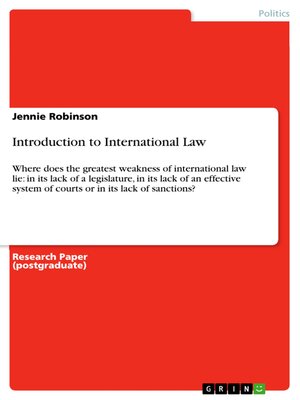Introduction to International Law
ebook ∣ Where does the greatest weakness of international law lie: in its lack of a legislature, in its lack of an effective system of courts, or in its lack of sanctions?
By Jennie Robinson

Sign up to save your library
With an OverDrive account, you can save your favorite libraries for at-a-glance information about availability. Find out more about OverDrive accounts.
Find this title in Libby, the library reading app by OverDrive.



Search for a digital library with this title
Title found at these libraries:
| Library Name | Distance |
|---|---|
| Loading... |
Research Paper (postgraduate) from the year 2007 in the subject Politics - Topic: Public International Law and Human Rights, grade: B+, University of Malta, language: English, abstract: The dispersion and fragmentation of power in the community of states system, developed since the 1648 Peace of Westphalia, lie within a 'horizontal' framework of international relations. Such structure bears an anarchical nature, that is, there is not yet one world government to enforce international law and proper sanctions, nor an effective court system. Indeed so far, states seem to rather pursue their own interests, as they are still being the main actors under the remit of international law. Cassese argues that, states' power of legal rules' 'auto-interpretation' is "a power that necessarily follows from the absence of courts endowed with general and compulsory jurisdiction".1
This assignment, with its different sections, will attempt to address the question: "Where does the greatest weakness of international law lie: in its lack of a legislature, in its lack of an effective system of courts or in its lack of sanctions?"







